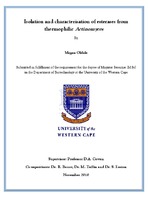Isolation and characterisation of esterases from thermophilic Actinomyces
Abstract
Alternative sources of fuel are required worldwide, and bio-ethanol is the leading candidate. Lignocellulosic biomass, a waste component of the agricultural industry, is a promising renewable source. Due to its complex structure it is highly recalcitrant, requiring the synergistic action of a battery of enzymes to achieve complete digestion. These enzymes include cellulases, hemicellulase and the accessory enzymes acetyl xylan esterase (AXE) and ferulic acid esterase (FAE). Thermpohilic Actinomyces isolates with the ability to hydrolyze xylan were screened for esterase activity. Two isolates (ORS10 and GSIV1), identified as Streptomyces spp, were positive for AXE activity. A cosmid library representative of isolate ORS10 was composed and screened for AXE activity using -naphthyl acetate as substrate. An 18 kb cosmid clone, 18D7, tested positive for AXE activity. Intracellular fractions extracted from ORS10 were precipitated with ammonium sulphate and partially purified 161-fold. Specific activity was measured after dialysis and ion-exchange chromatography. Overall yield of the partially purified enzyme was 34 %. Two protein bands of molecular masses 40 kDa and 60 kDa have been subjected to trypsin digestion and MALDI-TOF mass spectrometry analysis. The partially purified AXE displayed optimum activity at pH 9 and at 50°C. AXE activity was stable for at least 1.5 hours between 30°C and 40°C, and for 24 hours between pH 6-9. The kM and Vmax values were 16.93 mg/ml and 1645 units/mg enzyme, respectively. The stability of the partially purified AXE at 30°C-40°C suggests potential for industrial applications that utilise mesophilic fermentations.

